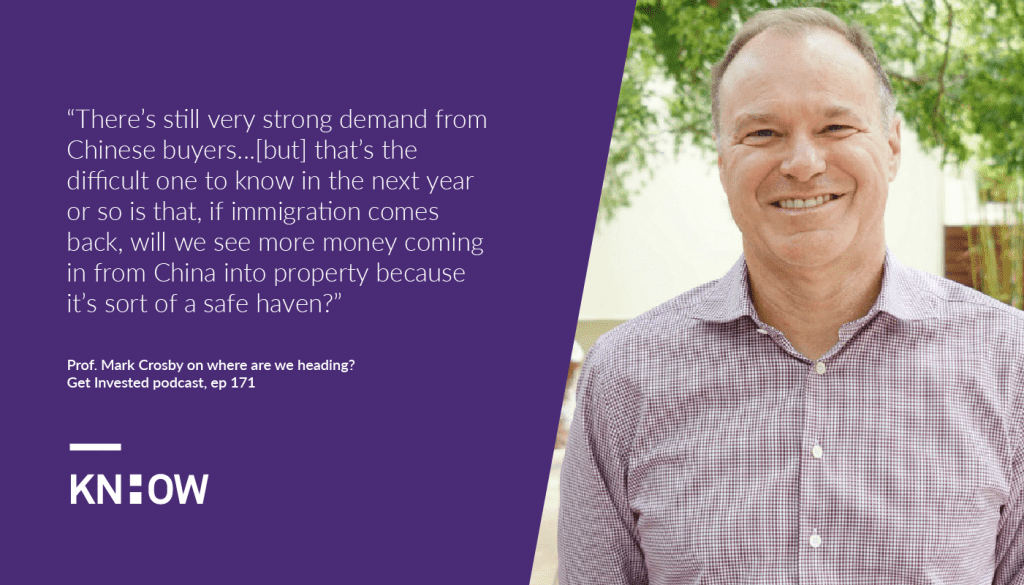Professor Mark Crosby predicts a shift in property prices in 2022 depending on immigration patterns and the re-opening of international borders.
The international macroeconomist and Monash Business School Professor said immigration and Australia’s relationship with China in particular can have a big impact on the short to medium term future of the Australian property market.
Prof. Crosby expects Australian property to slow down in 2022, following a huge year of growth.
“I think the interesting thing will be next year, if international travel comes back and international trade comes back more to normal, what will that look like? So I’m not super pessimistic, but I think the bounce we’re getting at the moment is probably a bit of an excessive bounce,” he said on the Get Invested podcast.
“We might see unemployment rise a little bit next year and the economy slowed down, and that will of course mean things like property prices also perhaps not growing.
“But a lot of that is about confidence. So if people are creating businesses and jobs and are confident about that and enough people do it, that will keep the economy ticking along. If people start to get worried for whatever reason, then the fundamentals underlying our economy – immigration, which drives construction and and so on – are quite weak, so there is probably a lot more risk on the downside than what we would normally see.”
KnowHow founder Bushy Martin is also expecting a change in the demand – supply ratio which has been driving property prices up.
“We’ve had a coiled spring over the last 12 months or so with COVID, and once you let that spring go, you’re going to have a bit of a bounce given that pent up demand,” he said.
“We’re also suffering from very limited supply of properties that have actually been listed for sale. So if you look the volumes are low and the supply of properties for sale is low, but people have got a lot of money and very cheap borrowings to get into property. So it’s not surprising that we’re seeing a very strong performance at the moment.
“But already we’re starting to see signs that the wind is coming out of that sail and will probably start to level off moving forward.”
Prof. Crosby said Chinese investors have a big influence on the Australian property market.
“As the Chinese government tells people in China not to invest money in Australia and send their kids to Australia, that doesn’t necessarily mean that people won’t do that, because the people who are most likely to come to Australia are more educated in the first place and more likely to question what the Chinese government says. And so you’re seeing that at the moment in the property market with still very strong demand from Chinese buyers, even though it’s harder for them to get onshore,” Mark said.
But a volatile environment remains, with Australia maintaining a tense relationship with China while still coming to grips with its COVID strategy.
“The difficult one to know in the property market in the next year or so is that if immigration comes back, will we see still immigration from China? And we might be seeing more money coming in from China into property because it’s a sort of safe haven. But it may be that the Chinese government puts more restrictions on taking money out and makes it harder for people to do that.
“I think that the driver fundamentally in the property market with immigration is not so strong. So in Melbourne and Sydney, we’ve basically had one hundred thousand people a year moving into our two biggest cities, and that’s a big push up. And the way I always think about this is that’s more demand for land, so land prices go up. The property sitting on top of it is not really going up, but it’s sitting on land. And in the smaller cities, the same thing is going on.
“So if you don’t have people coming in, you’ve got to have less growth in land prices eventually and and therefore less growth in property prices. So that to me is the biggest question mark going forward.”
Bushy added that immigration may continue to impact property prices for some time, even after the borders re-open.
“To some degree, it’s a bit of a lagging impact because a lot of immigrants initially are renting for a period. So, it certainly puts pressure on rental markets, but it takes anywhere between two to four years before they start to put down permanent roots and buy property themselves,” he said.
Listen to the full interview here.
Want to Know How you can build wealth with the help of leading, qualified experts? Talk to the team at KnowHow, now.




